Related Research Articles
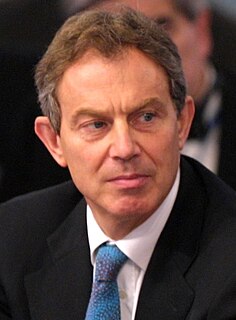
The 2001 United Kingdom general election was held on Thursday 7 June 2001, four years after the previous election on 1 May 1997, to elect 659 members to the House of Commons. The governing Labour Party was re-elected to serve a second term in government with another landslide victory, returning 412 members of Parliament versus 418 from the 1997 general election, a net loss of six seats, though with a significantly lower turnout than before—59.4%, compared to 71.3% at the previous election. The number of votes Labour received fell by nearly three million. Tony Blair went on to become the first Labour Prime Minister to serve two consecutive full terms in office. As Labour retained almost all of their seats won in the 1997 landslide victory, the media dubbed the 2001 election "the quiet landslide".

The 1997 United Kingdom general election was held on 1 May 1997. The incumbent governing Conservative Party led by Prime Minister John Major was defeated in a landslide by the Labour Party led by Tony Blair.
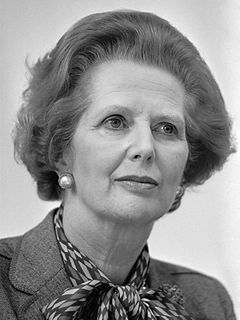
The 1983 United Kingdom general election was held on Thursday 9 June 1983. It gave the Conservative Party under the leadership of Margaret Thatcher the most decisive election victory since that of the Labour Party in 1945, with a landslide majority of 144 seats.

The 1992 United Kingdom general election was held on Thursday 9 April 1992, to elect 651 members to the House of Commons of the United Kingdom. The election resulted in the fourth consecutive victory for the Conservative Party since 1979 and would be the last time that the Conservatives would win an overall majority at a general election until 2015. This election result took many by surprise, as opinion polling leading up to the election day had shown the Labour Party, under leader Neil Kinnock, consistently, if narrowly, ahead.

The 1987 United Kingdom general election was held on Thursday, 11 June 1987, to elect 650 members to the House of Commons of the United Kingdom. The election was the third consecutive general election victory for the Conservative Party, and second landslide under the leadership of Margaret Thatcher, who became the first Prime Minister since the Earl of Liverpool in 1820 to lead a party into three successive electoral victories.

The October 1974 United Kingdom general election took place on Thursday 10 October 1974 to elect 635 members of the British House of Commons. It was the second general election held that year, the first year that two general elections were held in the same year since 1910, and the first time that two general elections were held less than a year apart from each other since the 1923 and 1924 elections, which took place 10 months apart. The election resulted in the Labour Party led by Harold Wilson winning the narrowest majority recorded, 3 seats. This enabled the remainder of the Labour government, 1974–1979 to take place, which saw a gradual loss of its majority.

The 1951 United Kingdom general election was held twenty months after the 1950 general election, which the Labour Party had won with a slim majority of just five seats. The Labour government called a snap election for Thursday 25 October 1951 in the hope of increasing its parliamentary majority. However, despite winning the popular vote and achieving both the highest-ever total vote and highest percentage vote share, Labour won fewer seats than the Conservative Party. This election marked the return of Winston Churchill as Prime Minister, and the beginning of Labour's thirteen-year spell in opposition. This was the final general election to be held with George VI as monarch, as he died the following year on 6 February and was succeeded by his daughter, Elizabeth II. This was also the last election in which the Conservatives did better in Scotland than in England.

The 1955 United Kingdom general election was held on Thursday 26 May 1955, four years after the previous general election in 1951. It was a snap election: After Winston Churchill retired in April 1955, Anthony Eden took over and immediately called the election in order to gain a mandate for his government. It resulted in a majority of 60 seats for the government under new leader and Prime Minister Sir Anthony Eden; the result remains the largest party share of the vote at a post-war general election. This was the first general election to be held with Elizabeth II as monarch, having succeeded her father George VI a year after the previous election.
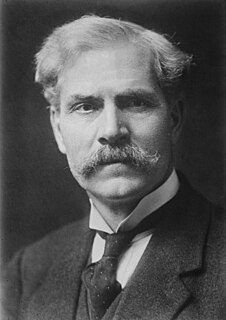
The 1931 United Kingdom general election was held on Tuesday 27 October 1931 and saw a landslide election victory for the National Government which had been formed two months previously after the collapse of the second Labour government. Collectively, the parties forming the National Government won 67% of the votes and 554 seats out of 615. The bulk of the National Government's support came from the Conservative Party, and the Conservatives won 470 seats. The Labour Party suffered its greatest defeat, losing four out of every five seats compared with the previous election. The Liberal Party, split into three factions, continued to shrink and the Liberal National faction never reunited. Ivor Bulmer-Thomas said the results "were the most astonishing in the history of the British party system". It is the most recent election in which one party received an absolute majority of the votes cast, and the last UK general election not to take place on a Thursday. It would be the last election until 1997 in which a party won over 400 seats in the House of Commons.

The 1999 European Parliament election was the United Kingdom's part of the European Parliament election 1999. It was held on 10 June 1999. Following the European Parliamentary Elections Act 1999, it was the first European election to be held in the United Kingdom where the whole country used a system of proportional representation. In total, 87 Members of the European Parliament were elected from the United Kingdom across twelve new regional constituencies.
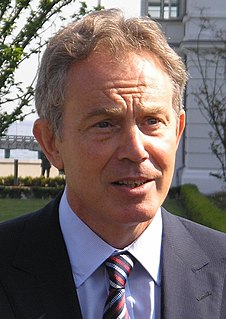
The 2005 United Kingdom general election was held on Thursday 5 May 2005, to elect 646 members to the House of Commons. The Labour Party, led by Tony Blair, won its third consecutive victory, with Blair becoming the only Labour leader besides Harold Wilson to form three majority governments. However, its majority fell to 66 seats compared to the 167-seat majority it had won four years before. This was the first time the Labour Party had won a third consecutive election, and remains the party's most recent general election victory.

The 2010 United Kingdom general election was held on Thursday 6 May 2010, with 45,597,461 registered voters entitled to vote to elect members to the House of Commons. The election took place in 650 constituencies across the United Kingdom under the first-past-the-post system. The election resulted in a large swing to the Conservative Party similar to that seen in 1979; the Labour Party lost the 66-seat majority it had previously enjoyed, but no party achieved the 326 seats needed for a majority. The Conservatives, led by David Cameron, won the most votes and seats, but still fell 20 seats short. This resulted in a hung parliament where no party was able to command a majority in the House of Commons. This was only the second general election since the Second World War to return a hung parliament, the first being the February 1974 election. However, a hung parliament was anticipated this time, so politicians and voters were better prepared for the constitutional process that would follow such a result. The coalition government that was subsequently formed was the first to eventuate directly from a UK election. The hung parliament came about in spite of the Conservatives managing both a higher vote total and a higher share of the vote than the previous Labour government had done in 2005, when it secured a comfortable majority. A total of 149 sitting MPs stood down at the election, the highest since 1945, including many former New Labour Cabinet ministers such as former Deputy Prime Minister John Prescott, Alan Milburn, Geoff Hoon, Ruth Kelly, James Purnell and John Reid. One reason for the very high number of MPs standing down was the parliamentary expenses scandal a year earlier.
Scottish Labour is a social democratic political party in Scotland. It is an autonomous section of the UK Labour Party. From a high of holding 56 of the 129 seats at the first Scottish parliament election in 1999, the Party has declined each election until getting just 22 MSPs elected at the 2021 election. The party currently holds one of 59 Scottish seats in the UK House of Commons.
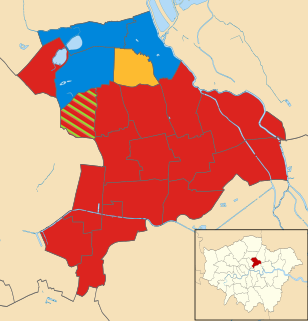
Elections for London Borough of Hackney Council were held on Thursday 4 May 2006. The whole council was up for election. Hackney is split up into 19 wards, each electing three councillors, so a total of 57 seats were up for election.
The Labour Party is a centre-left political party in the United Kingdom that has been described as an alliance of social democrats, democratic socialists and trade unionists. In all general elections since 1922, Labour has been either the governing party or the Official Opposition. There have been six Labour prime ministers and thirteen Labour ministries.

The 2015 United Kingdom general election was held on Thursday, 7 May 2015 to elect 650 members to the House of Commons. It was the first and, as of 2021, the only general election at the end of a fixed-term Parliament. Local elections took place in most areas on the same day.
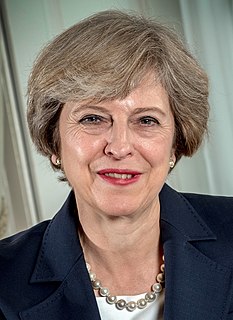
The 2017 United Kingdom general election was held on Thursday, 8 June 2017, two years after the previous general election in 2015. The governing Conservative Party remained the largest single party in the House of Commons but lost its small overall majority, resulting in the formation of a Conservative-led minority government with a confidence-and-supply agreement with the Democratic Unionist Party (DUP) of Northern Ireland.

The 2019 United Kingdom general election was held on Thursday, 12 December 2019. The Conservative Party, having failed to obtain a majority in the 2017 general election, had faced prolonged parliamentary deadlock over Brexit while it governed in minority with the support of the Democratic Unionist Party (DUP), a situation which had forced the resignation of the previous Prime Minister, Theresa May.
References
- ↑ "1970 -71 By Election Results". Archived from the original on 29 March 2012. Retrieved 8 September 2015.
- ↑ Result from previous election